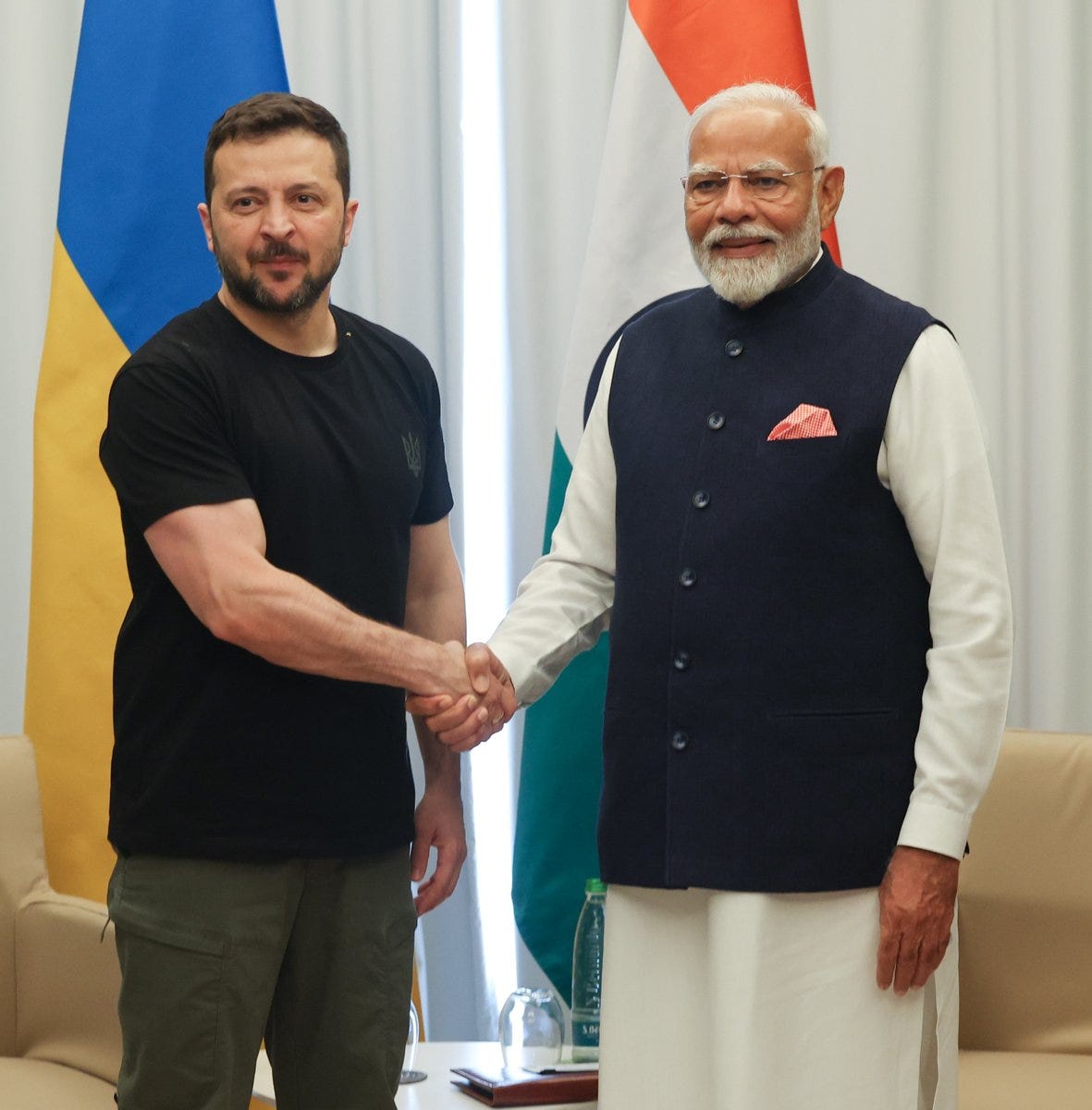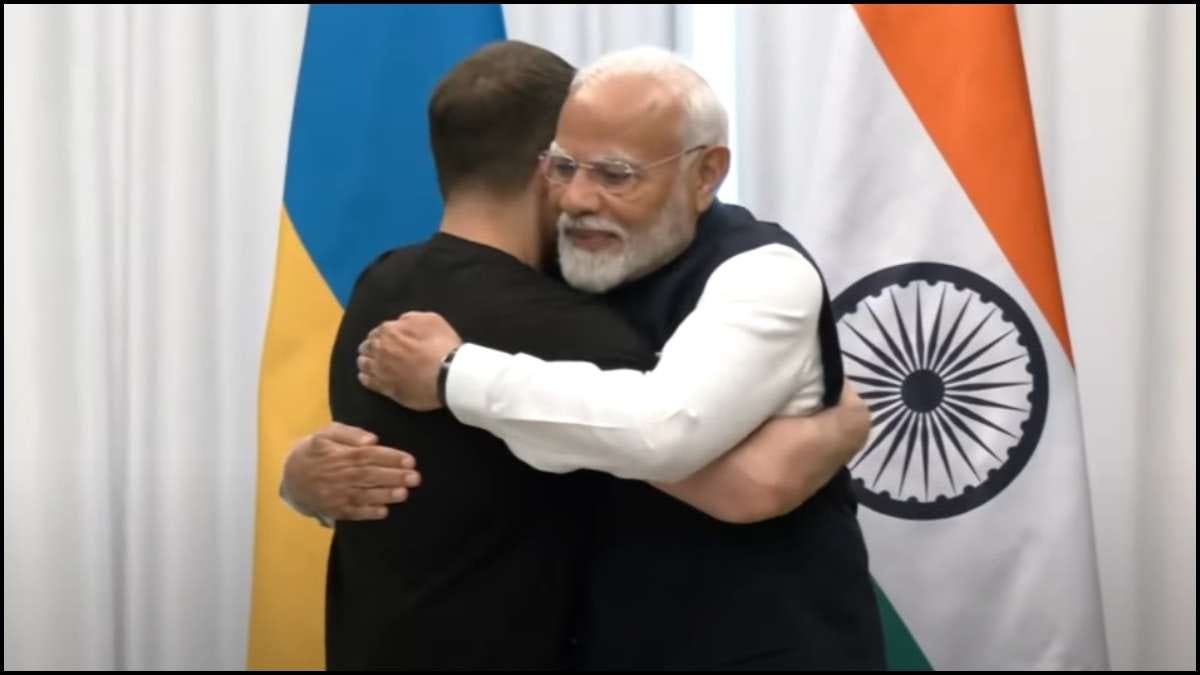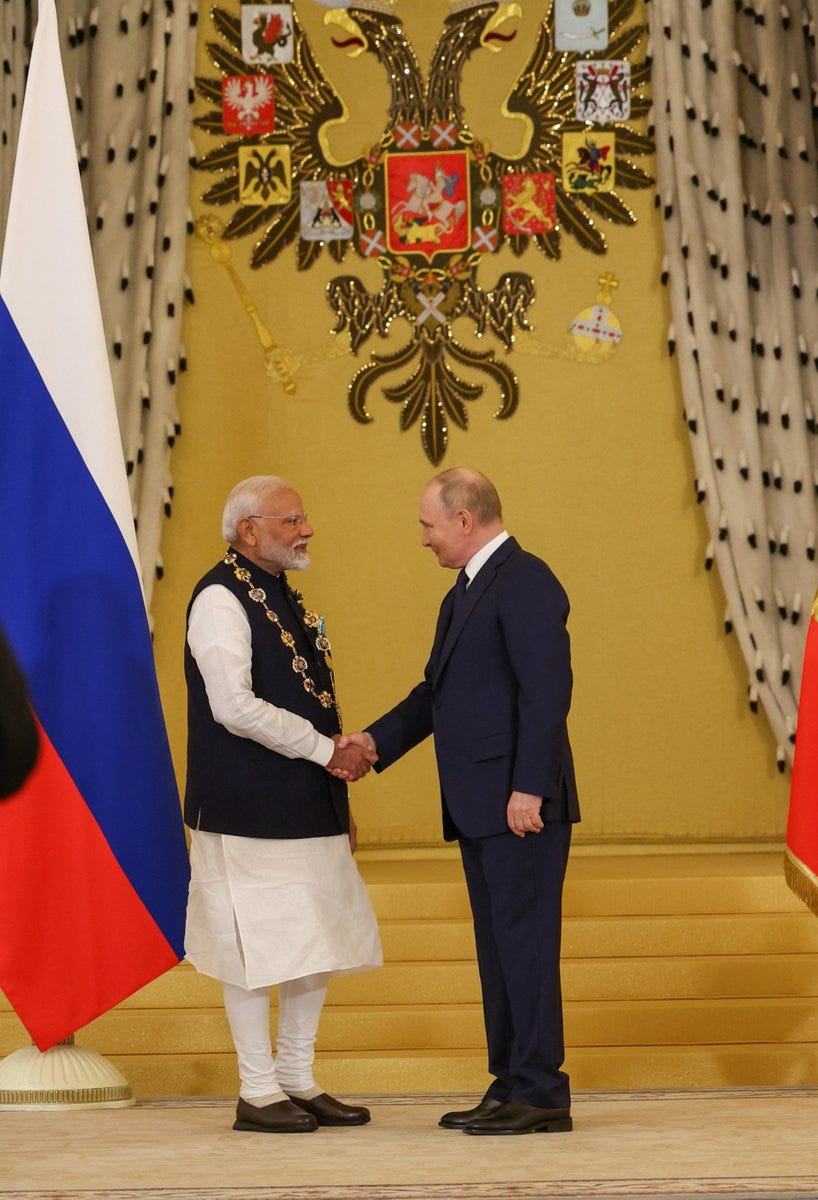PM Modi in the August Company of Ukraine President Zelenskyy
Prime Minister Modi's Strategic Visit to Ukraine: A Diplomatic Balancing Act, after His Russia Visit Earlier This Month that Ruffled Many a Feather.

Contextual Overview and Significance of the Visit
Prime Minister Narendra Modi’s upcoming visit to Ukraine on August 23, 2024, marks a historic milestone as the first by an Indian Prime Minister to the nation. This visit is especially significant given the delicate geopolitical tensions stemming from the ongoing Russia-Ukraine conflict. It reflects India's strategic endeavour to maintain a balanced stance while navigating its relationships with both Russian and Western interests.
Modi's Russian Engagement
During his recent visit to Russia, PM Modi engaged in extensive discussions with President Vladimir Putin, emphasizing trade, nuclear energy, and space exploration. Notably, Modi was formally presented with Russia's highest civilian honour, the Order of St Andrew the Apostle the First-Called. This visit, however, drew sharp reactions from global leaders due to its timing and the geopolitical tensions it navigated.
Global Reactions and India's Stance
a.) Ukraine's Strong Reaction to Modi-Putin Meeting
Ukrainian President Volodymyr Zelenskyy was vocal in his criticism of Prime Minister Narendra Modi's interaction with Russian President Vladimir Putin, particularly highlighting the warm greeting shared between the two leaders during Modi's visit to Russia. Zelenskyy described the encounter as a "disappointment and a devastating blow to peace efforts." His disapproval was further intensified by the timing of the visit, which coincided with a Russian missile strike on a Ukrainian children's hospital. Zelenskyy's response underscores the strained emotions and complex diplomatic entanglements resulting from the ongoing conflict.
b.) US Disappointment and Calls for Responsibility
The United States also expressed its discontent with the timing and symbolism of PM Modi's visit to Russia. During a Congressional hearing, US Assistant Secretary of State for South and Central Asia, Donald Lu, remarked on the disappointment felt by the US, particularly as Modi's visit overlapped with the NATO summit's 75th anniversary. Furthermore, US Ambassador to India, Eric Garcetti, cautioned India against taking its relationships for granted, urging for sustained and trustworthy friendships in times of crisis. The US State Department pushed for India to leverage its long-standing ties with Russia to help bring an end to what it described as the "illegal war" in Ukraine.
c.) India's Reassertion of Strategic Autonomy
In response to international criticism, India firmly defended its diplomatic moves. The Ministry of External Affairs, through spokesperson Randhir Jaiswal, asserted India's historical and mutual interests with Russia, emphasizing the country's right to strategic autonomy. "India has a long-standing relationship with Russia based on mutuality of interests," Jaiswal stated, highlighting the complexity of global diplomacy where "all countries have the freedom of choice." This strong rebuttal underscores India's commitment to maintaining its foreign policy objectives while navigating the challenges posed by alignment with global power blocs.
India’s Stance on the Russia-Ukraine Conflict
India has adopted a position of strategic neutrality since the onset of the Russia-Ukraine war in February 2022. This stance is evident through various diplomatic and humanitarian actions:
a.) UN Voting Patterns
India's approach at the United Nations has been one of cautious engagement. Initially abstaining from resolutions condemning Russian aggression, India marked a significant shift by voting against Russia during a procedural vote at the UNSC in August 2022. This decision underscored a nuanced shift in India’s diplomatic posture, reflecting a careful calibration of its international obligations and strategic interests.
b.) Diplomatic and Humanitarian Initiatives
India has maintained a balanced approach in its diplomatic communications, consistently advocating for the respect of state sovereignty and the cessation of hostilities without directly confronting Russia. By emphasizing the principles of territorial integrity and the urgent need to halt conflicts, India's diplomatic statements carefully navigate the complex geopolitical landscape, ensuring a stance that supports global peace and stability while diplomatically engaging with all parties involved.
c.) Humanitarian Initiatives and Evacuation of Indian Students
It has also provided substantial humanitarian aid to Ukraine, including the delivery of essential medicines and power generators, with the 15th consignment reaching in July 2024. Moreover, India's Operation Ganga was a major effort to evacuate over 22,500 Indian nationals from Ukraine, demonstrating its commitment to its citizens abroad.
Renewed India-Ukraine Bilateral Relations
Historically, India's ties with Russia have been robust; however, the conflict has brought a renewed focus on strengthening relations with Ukraine:
a.) Economic and Educational Ties
Prior to the conflict, Ukraine was a significant supplier of sunflower oil, fertilizers, and military equipment to India. The country has also been a favoured destination for Indian students pursuing medical education. The ongoing war has disrupted these exchanges, prompting a reassessment of bilateral engagements.
b.) Potential Military Cooperation
Looking ahead, there is significant potential for collaboration between India and Ukraine in military technology, with a particular focus on naval equipment. Such cooperation would align with the strategic interests of both nations, contributing to regional stability. While India was a special invitee at the G7 summit in Rome, Italy, and PM Modi had a brief meeting with President Zelensky on the sidelines, it was not involved in the negotiations that led to the U.S.-Ukraine Security Pact (video). Concurrently, on the sidelines of the summit, U.S. President Joe Biden and Ukrainian President Volodymyr Zelensky formalized a 10-year security agreement, underscoring a major commitment with a $50 billion aid package from the G7 nations.
Strategic Balancing in India's Foreign Policy
India's diplomatic strategy is driven by a desire to uphold its policy of non-alignment while engaging with global powers:
a.) Economic and Strategic Interests
India has increased its imports of discounted Russian oil, which aligns with its energy needs and economic interests. Simultaneously, it seeks to maintain healthy trade relations with Ukraine, balancing its economic engagements across the geopolitical divide.
b.) Diplomatic Engagements
India's participation in discussions around President Zelenskyy's Peace Formula and other diplomatic initiatives underscores its willingness to contribute constructively to global peace efforts.

Expected Outcomes of PM Modi’s Visit
Prime Minister Modi's visit could potentially recalibrate the regional perceptions and reinforce India's role as a mediator:
a.) Balancing Global Perceptions
Prime Minister Narendra Modi's forthcoming visit to Ukraine is strategically positioned to adjust global perceptions following his recent visit to Russia, which garnered attention from Western allies. By engaging directly with Ukraine, Modi intends to reassure these nations of India's commitment to a balanced foreign policy. This diplomatic maneuver is crucial for demonstrating India's independence, underscoring its role as a significant player on the global stage that is not overly influenced by any particular geopolitical alliance.
b.) Facilitating Peace Efforts
The visit also presents an opportunity for India to assert itself as a potential mediator in the ongoing conflict between Russia and Ukraine. Engaging with Ukrainian leaders could enable India to facilitate peace talks, leveraging its unique diplomatic relations with Russia and its stature in international affairs. This role could be pivotal in promoting dialogue and exploring peaceful solutions, thereby showcasing India's capability to contribute positively to global peace initiatives.
c.) Strengthening Bilateral Relations
Economic and strategic cooperation will be a key agenda during Modi's visit, aiming to deepen India-Ukraine ties. The two countries have historically traded crucial commodities and military equipment, and the visit could broaden these interactions to include technology and pharmaceutical sectors, among others. Enhancing these ties is beneficial for economic growth and supports strategic alliances that are vital in a multipolar world, reflecting a mutual commitment to long-term partnership and cooperation.
d.) Enhancing Humanitarian Support
Humanitarian assistance is a significant component of Modi's agenda in Ukraine. India has previously extended considerable aid to Ukraine, and further support for the nation’s reconstruction efforts is likely to be announced during this visit. This may encompass medical aid, infrastructure rebuilding, or educational initiatives, which highlight India's dedication to supporting Ukraine’s recovery. Through such contributions, Modi's visit emphasizes India’s role in championing humanitarian values alongside safeguarding its strategic interests in the region.
Summing and Looking Forward: India's Role on the Global Stage
Prime Minister Modi's visit to Ukraine is a clear demonstration of India’s strategic intent to engage constructively in global affairs while upholding its sovereign interests. This trip not only embodies India's balanced approach to international diplomacy but also enhances its stature as a global power capable of mediating complex international conflicts, thus contributing to global peace and stability. The visit reflects PM Modi’s proactive initiative, occurring shortly after his trip to Russia, which notably ruffled many a diplomatic feather. As India continues to navigate its intricate relationships with both Russia and Western nations, this visit represents a crucial step in defining India’s increasingly important role within a multipolar world order.


